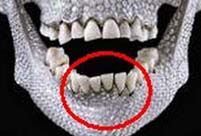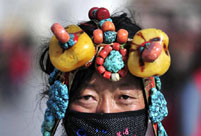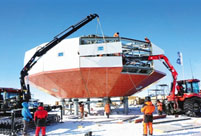 Amazing cliff diving in cold winter
Amazing cliff diving in cold winter
 Enjoy Sochi 2014 in slow motion
Enjoy Sochi 2014 in slow motion
 University student sentenced to death for poisoning roommate
University student sentenced to death for poisoning roommate
 Chinese lunar New Year celebrated in San Francisco
Chinese lunar New Year celebrated in San Francisco
 Taiwan Lantern Festival 2014
Taiwan Lantern Festival 2014
 Haiyang Yangge: make up
Haiyang Yangge: make up
 China's top 10 richest cities
China's top 10 richest cities
 President Xi visits garrison troops in Inner Mongolia
President Xi visits garrison troops in Inner Mongolia
 Turnip sculptures amaze tourists in Qingdao
Turnip sculptures amaze tourists in QingdaoBEIJING, Feb. 22 -- After days of lingering smog, the Beijing municipal government has for the first time issued an orange alert for heavy air pollution, initiating an emergency response.
The alert, issued on Friday and the second highest after red, requires manufacturing plants in the city to suspend or cut production, building work to be halted, and even no barbecues, according to the emergency response program.
Physical education classes, outdoor exercise and sports meets at kindergartens, primary and high schools have to be called off.
If the alert is raised to red, schools will be suspended and half of the number of vehicles will be off the road based on even- and odd-numbered license plates, according to the program.
Smog will continue to blanket China's north and central regions on Saturday as the the National Meteorological Center (NMC) issued a yellow alert for air pollution.
Beijing, Tianjin and parts of Hebei, Shandong, Henan, Shaanxi and Shanxi provinces expect heavy air pollution from Saturday morning to Sunday morning, according to the NMC forecast.
Beijing, Tianjin and Hebei Province have been suffering heavy smog since Thursday. On Friday, PM 2.5 readings in these regions kept rising and exceeded 200 micrograms per cubic meter, far above the 25 micrograms level considered safe by the World Health Organization.
The NMC on Thursday forecast the smog would last for a week as no cold front is in sight to help disperse it.
DOUBTS OVER VEHICLE CONTROL
Although there has been debate on the major causes of smog, local governments have targeted vehicle emissions, hoping less car use will help reduce air pollution.
Following the cities of Beijing, Shanghai, Guangzhou and Guiyang, Tianjin Municipality now has rules on vehicle purchases, by capping the number of new license plates that are released. Potential buyers have to get license plates through a monthly lottery or auction.
According to Tianjin's traffic management bureau, more than 150,000 applicants will vie for 9,100 plates through an auction on Feb. 25 or a lottery on Feb. 26.
Like Beijing's traffic control policy that took effect in 2008, Tianjin this year will take one fifth of private cars off the road on weekdays based on the final digit of car plate numbers.
However, policies have attracted criticism.
A research found less than 4 percent of Beijing's PM 2.5, pollutant airborne particles smaller than 2.5 microns in diameter, was contributed by vehicle emissions.
Zhang Renjian, a researcher with the Institute of Physics at the Chinese Academy of Sciences, released the findings in December, sparking wide debate.
Although the academy later clarified that the research "seriously underestimated" the impact of vehicle emissions to air quality, experts believe controlling the number of cars on the road is not a solution to the lingering smog.
"Smog cannot be solved by capping the number of cars or restricting them from running," said Niu Wenyuan, an expert on sustainable development and a consultant for the State Council, China's cabinet.
ECONOMIC LEVERAGE
Having realized the seriousness of the problem, Chinese provincial governments have resorted to economic tools to encourage environmental protection and help reduce pollution.
In north China's Hebei Province, the provincial government has offered cheaper electricity to power plants that upgrade their equipment, said Zhang Shaohua, deputy head of the provincial development and reform commission.
According to control measures released by the province in September, all 19 thermal power plants in the region should upgrade their equipment for dust collection.
To encourage this, the government will offer 20 yuan (3.3 U.S. dollars) for per 100 kwh of generated electricity, Zhang said.
The province will also slash capacities by 15 million tonnes of steel, 10 million tonnes of cement and use 15 million fewer tonnes of coal this year, according to a government work report released last month.
Tianjin Municipality, which borders Hebei, launched carbon emissions trading in December, following Shenzhen, Shanghai and Beijing.
Under the trading program, companies that produce more than their fair share of emissions will have to buy unused quotas on the market from companies that cause less pollution.
Environmental protection authorities in Beijing are getting banks involved.
In a joint circular released in August by the city's environmental protection bureau, the China Banking Regulatory Commission and its Beijing branch, companies with poor pollution records will be banned from obtaining bank loans, said Wang Ruixian, of the Beijing's environmental protection bureau.
Governments at all levels should explore more ways to fight smog, and encourage people to join the effort, Zhou Shengxian, minister of environmental protection, has said.
 Most gorgeous female celebs in Chi-pao
Most gorgeous female celebs in Chi-pao Second round of test kicks off at Beijing Film Academy
Second round of test kicks off at Beijing Film Academy Ancient Qiang people had vertically grown teeth
Ancient Qiang people had vertically grown teeth Top 10 Chinese youth’s favorite seaside destinations
Top 10 Chinese youth’s favorite seaside destinations Traditional Tibetan clothing tailors
Traditional Tibetan clothing tailors In photos: Unveiling Taishan station
In photos: Unveiling Taishan station Beautiful moments of family reunion
Beautiful moments of family reunion 10 Valentine's Day ideas for couples
10 Valentine's Day ideas for couples Let's get married today!
Let's get married today! Chinese warplanes C919 to appear at Singapore Airshow 2014
Chinese warplanes C919 to appear at Singapore Airshow 2014 Ruins of Shang Dynasty's structure unearthed in Shaanxi
Ruins of Shang Dynasty's structure unearthed in Shaanxi  Intercity high speed train in operation
Intercity high speed train in operation Severe coldness freezes large parts of China
Severe coldness freezes large parts of China  Beautiful moments of Sochi
Beautiful moments of Sochi  It's not just performing this year
It's not just performing this yearDay|Week|Month